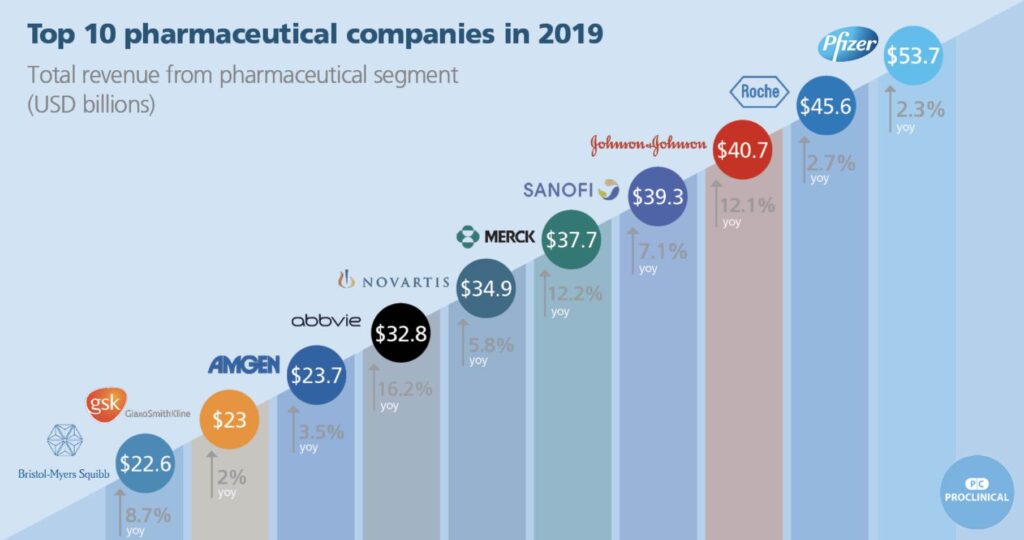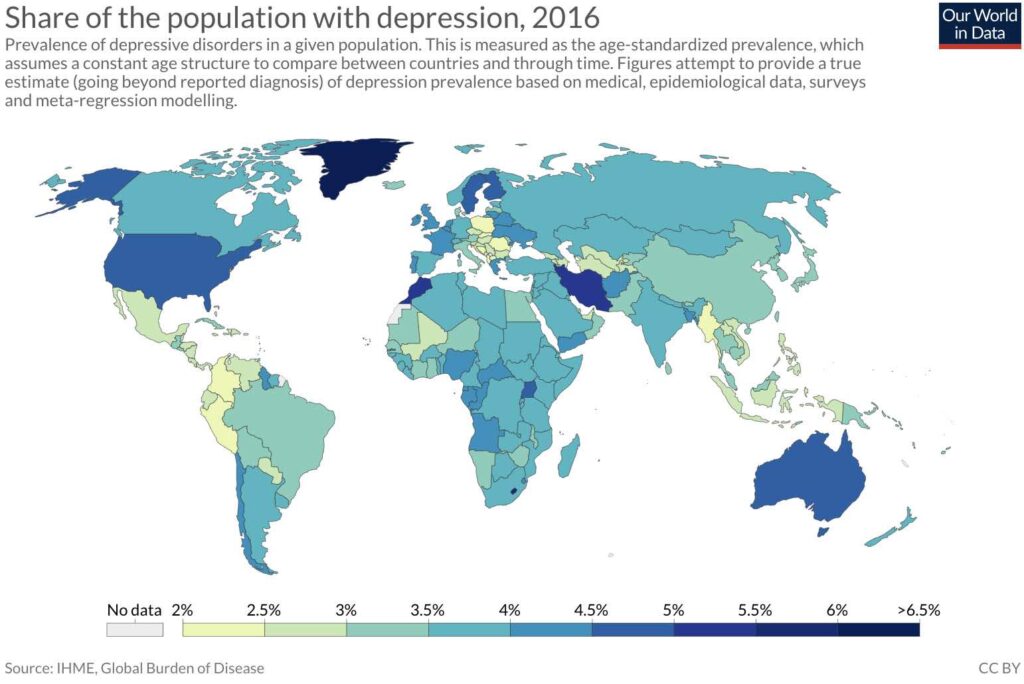With an annual cost of nearly a quarter trillion US dollars, treating depression in the United States is big business. Internationally, that number is even bigger, which has created entire industries around ‘treating’ those who suffer from chronic depression.
Perhaps the most well known depression treatment is a drug by the name of fluoxetine, which is better known as Prozac. American pharmaceutical giant Eli Lilly and Company first discovered fluoxetine in 1972, and entered medical use in 1986.
Since then, dozens of other pharmaceutical companies have developed similar drugs in an attempt to grab part of the massive market across the world. In 2019, the top pharmaceutical companies across the world all saw significant growth:

While all of these companies generate revenue from multiple different pharmaceutical products to treat diseases and ailments other than depression, it’s worth noting that Eli Lilly (who didn’t even make this list) has over 30 million prescriptions for Prozac alone.
The number one company in the world, Pfizer, once attributed well over $3 billion USD of revenue per year to their anti-depressant drug called Zoloft. However, their patent on Zoloft expired in 2006, allowing other pharmaceutical companies to launch their own generic versions.
With such big industries revolving around the treatment of mental disorders, one must really consider what’s in the best interest of a pharmaceutical company? Obviously a single pill or treatment that results in a lifelong cure for a patient would end up cannibalizing entire pharmaceutical products.
As tempting as it is to accuse major pharmaceutical companies of some type of larger conspiracy to only treat patients instead of curing them, we’ll only look at this from a purely rational perspective. We’ll just assume that the hundreds of thousands of employees that work for the dozens of international pharmaceutical companies aren’t in on a larger concerted effort to keep all of their patients in a constant state of treatment.
Instead, we can assume that pharmaceutical companies are incentivized to invent and bring to market revolutionary drugs. These drugs must be unique in such a way that patents can be filed and issued to the parent company, which results in a proprietary product that the company can sell at prices where a significant margin exists.
The higher a company can drive profits, the more motivated they will be to bring specific drugs to the market. Considering the hundreds of billions of dollars spent every year worldwide, there are significant incentives to create products that can grab part of that market share.
However, that also comes with a price to the average person paying for health insurance. “In 2016, Blue Cross plans spent $10,673 on those diagnosed with ‘major depression’ compared to $4,283 on those without a depression diagnosis.” –Forbes.

As pharmaceutical companies are further incentivized to create proprietary drugs requiring massive amounts of research and funding, the consumer will only experience increases in prices for the treatments that they are prescribed.
Furthermore, those who aren’t even experiencing depression will feel the effects by way of higher medical costs, as the insurance industry will balance out the high costs of one person’s treatment onto another’s monthly insurance premium.
Overall, it’s bad business when one industry’s (pharmaceuticals) profits are generated by insurance consumers who don’t even use their products.
If you’re thinking that this sounds a lot like socialism (or communism), you’re right. Any time someone is forced to pay for services that they don’t even use, a misalignment forms that usually results in a breakdown at some point.
That resulting breakdown can materialize in a variety of different ways. One extreme might be the social unraveling that we are witnessing in Venezuela, while the other extreme (and much more likely scenario for this specific industry) will be that pharmaceutical companies just aren’t incentivized to create breakthrough products.
Instead, they are incentivized to maintain their proprietary pharmaceutical formulations and even more importantly, maintain their marketing and medical industry domination. They can simply outspend smaller competitors with marketing and sales campaigns, even if the small competitor has a better product.
Anytime you have industries that are not rewarded for pushing the boundaries, we all end up with lack of innovation, minimal price competition, and stagnant growth. None of that is beneficial to the consumer, as moats are built around companies that have spent enormous amounts of money to jump through regulatory hoops, hire lobbyists to influence political decisions, and acquire small competitors to squash their threatening products.
Before this takes a ‘where is the fairness in the medical industry’ turn… I want to emphasize the fact that I believe capitalism is the best solution we have to run a successful society. Capitalism rewards those who put in the hard work, who come up with the creative ideas, and who pull all of the pieces together to make big things happen.
Unfortunately, capitalism can get off track, especially when special interests and corrupt law makers get in the middle. Human greed can really screw things up!
There is no doubt that the medical industry has seen unbelievable transformations over the past century. Simple one-day medical procedures that many of us have gotten in our lives were once life-ending emergencies. We can transplant organs, put stents in arteries, and we’re now even discovering ways to increase our lifespan.
Many of these incredible advancements are due to disruptive technologies that have entered the medical field during the 20th century. Antibiotics, X-rays, and cancer treatments were once the stuff of science fiction. Today, they are some of the most common resources that medical professionals use everyday.
Now the question is, “What’s next for the medical world?”
There are companies really pushing the limits, like Insilico Medicine that uses artificial intelligence for drug discovery, biomarker development, and aging research. Or LyGenesis, which is an organ regeneration company enabling a patient’s own lymph nodes to be used as bioreactors to regrow functioning ectopic organs. (Both of these companies are part of a larger portfolio that we are investing in.)
While many companies are pushing the limits to find ways to cure biological ailments, there is a surprising trend that is now gaining traction for psychological treatment: plant medicine.
Plant medicines, specifically psychedelics, are now being used as a real way to treat and cure everything from depression to addiction. Furthermore, two US cities – Oakland, California and Denver, Colorado – just decriminalized possession of psychedelics.
Currently, psychedelics are listed as Schedule 1 drugs (the most dangerous) by the United States Drug Enforcement Agency (DEA), just like cannabis. If the trend continues for psychedelics, just as the trend has gone for cannabis, then we are in for some very interesting times in the coming years.
We’re already in discussions with several different parties to invest in this space.




